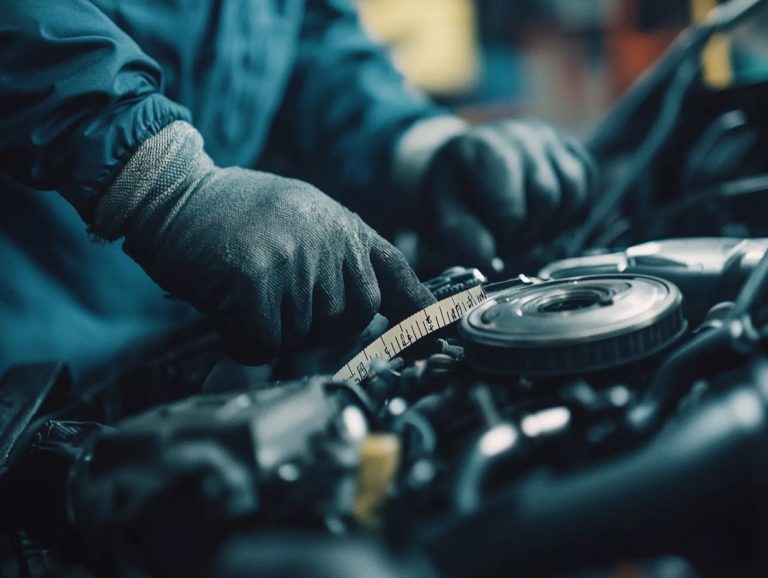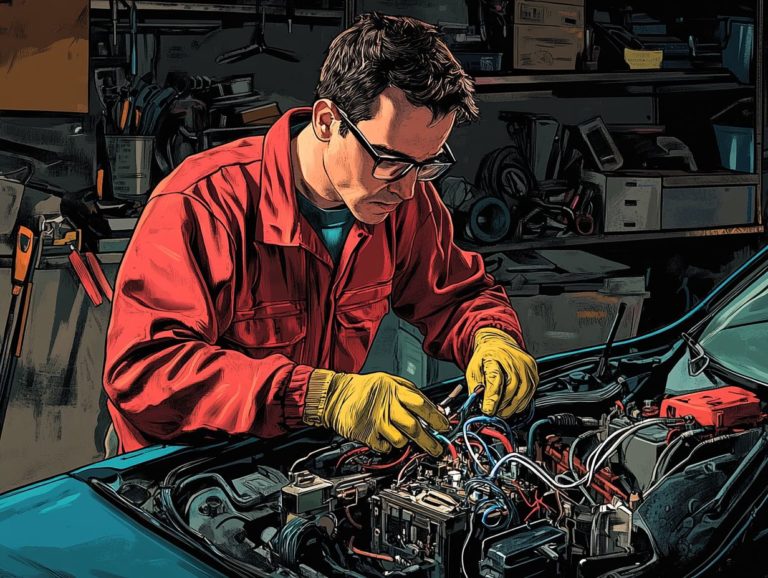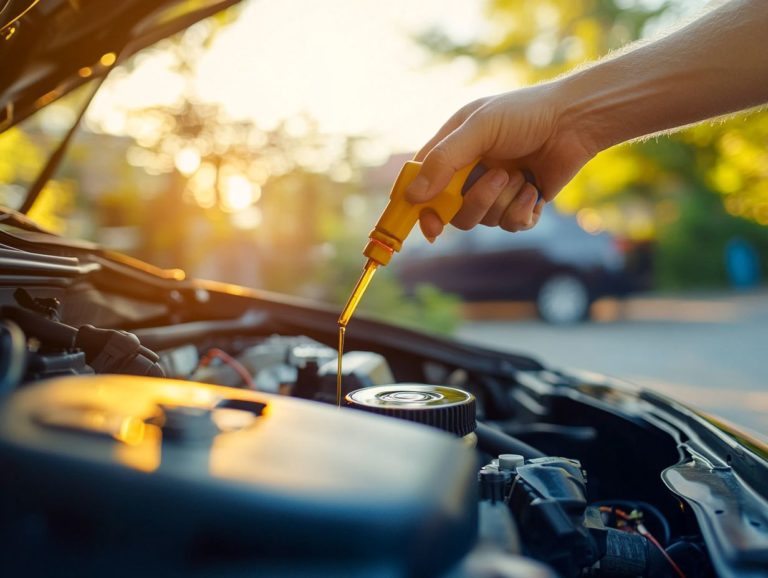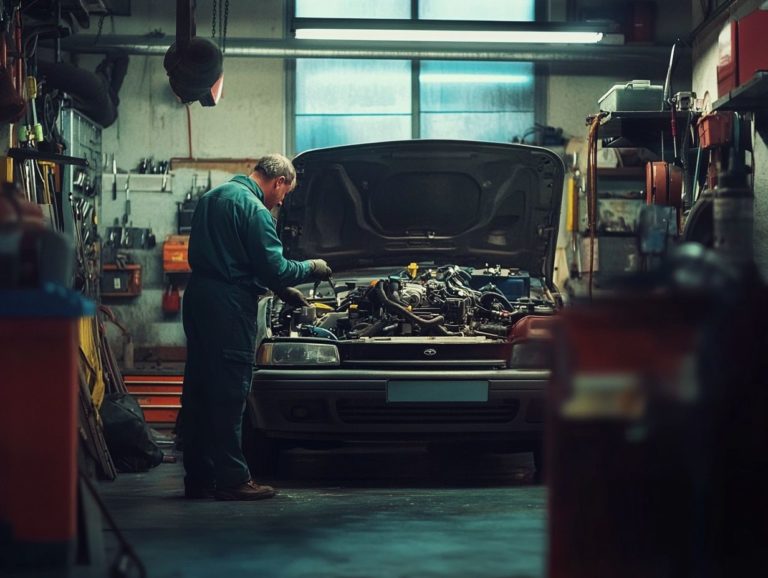What Are the Most Common Car Repairs?
Keep your car in top shape with regular maintenance; it s the key to a long life on the road! Maintaining your vehicle is essential for ensuring its longevity and optimal performance. Regular maintenance not only keeps your car running smoothly, but it also helps you avoid costly repairs in the future.
Common car repairs often involve the brake system, engine, electrical components, tires, and transmission. Being aware of the warning signs that suggest your car requires attention is vital. Selecting a trustworthy repair shop to handle any issues is equally important.
Stay informed and take proactive steps to keep your vehicle in exceptional condition!
Contents
- Key Takeaways:
- Why Regular Maintenance is Important
- Common Car Repairs
- Signs That Your Car Needs Repairs
- How to Choose a Reliable Car Repair Shop
- Frequently Asked Questions
- What Are the Most Common Car Repairs?
- What is the average cost of the most common car repairs?
- Why are oil changes considered one of the most common car repairs?
- Do I really need to replace my tires every few years?
- What should I do if my brakes start making a squealing noise?
- How often should I have my car’s battery checked?
Key Takeaways:
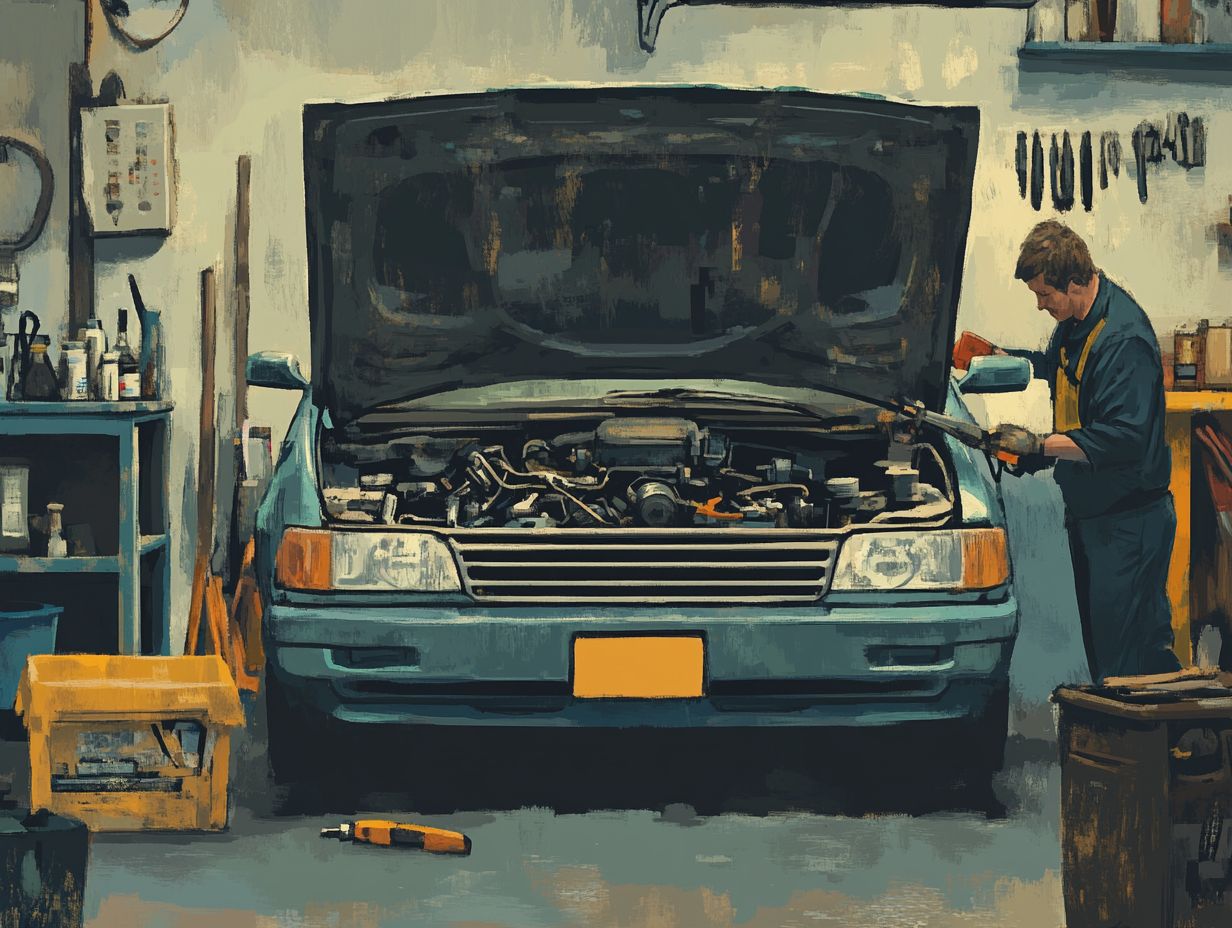
- Regular maintenance is essential to preventing common car repairs and prolonging the lifespan of your vehicle.
- The most common car repairs include brake system, engine, electrical system, tire and wheel, and transmission repairs.
- Pay attention to warning signs such as strange noises or warning lights. Choose a reliable car repair shop based on experience and customer reviews.
Why Regular Maintenance is Important
Regular maintenance preserves the longevity and performance of your vehicle. The Car Care Council emphasizes that effective preventive maintenance helps you avoid unexpected repairs. It also enhances engine performance, maximizes fuel efficiency, and reduces repair costs over time.
By following a regular car maintenance schedule that includes oil changes, brake inspections, and checks on vital components like the ignition and electrical systems, you can save substantially on repair bills. This ensures your car runs smoothly.
Common Car Repairs
Common car repairs cover a wide range of issues you might encounter as a vehicle owner, from basic maintenance to more intricate repairs. By prioritizing regular inspections and timely interventions, you can prevent more serious problems down the line and extend the lifespan of your car’s essential components.
Typical repairs you may face include:
- Replacing spark plugs – These help the engine burn fuel efficiently.
- Fuel caps
- Oxygen sensors – These ensure proper fuel combustion for better efficiency.
You may also need essential services like:
- Engine tune-ups
- Brake repairs
- Tire maintenance
Each of these repairs enhances your safety on the road and ensures your vehicle operates efficiently.
Brake System Repairs
Brake system repairs are essential for ensuring your vehicle’s safety and functionality. Regularly checking your brakes and brake pads is crucial, as these components are fundamental for safe driving. Neglecting these repairs can increase stopping distances, leading to perilous driving conditions.
Ignoring warning signs such as squeaking or grinding noises, a soft brake pedal, or vibrations while braking can transform minor issues into costly repairs. Inadequate maintenance can significantly impact brake disc wear, resulting in diminished effectiveness over time.
To maintain the integrity of your brakes, it s recommended that you replace the brake fluid according to the manufacturer s guidelines. Perform thorough inspections at regular intervals.
By prioritizing these precautions, you enhance your safety and extend the lifespan of your brake system.
Engine Repairs
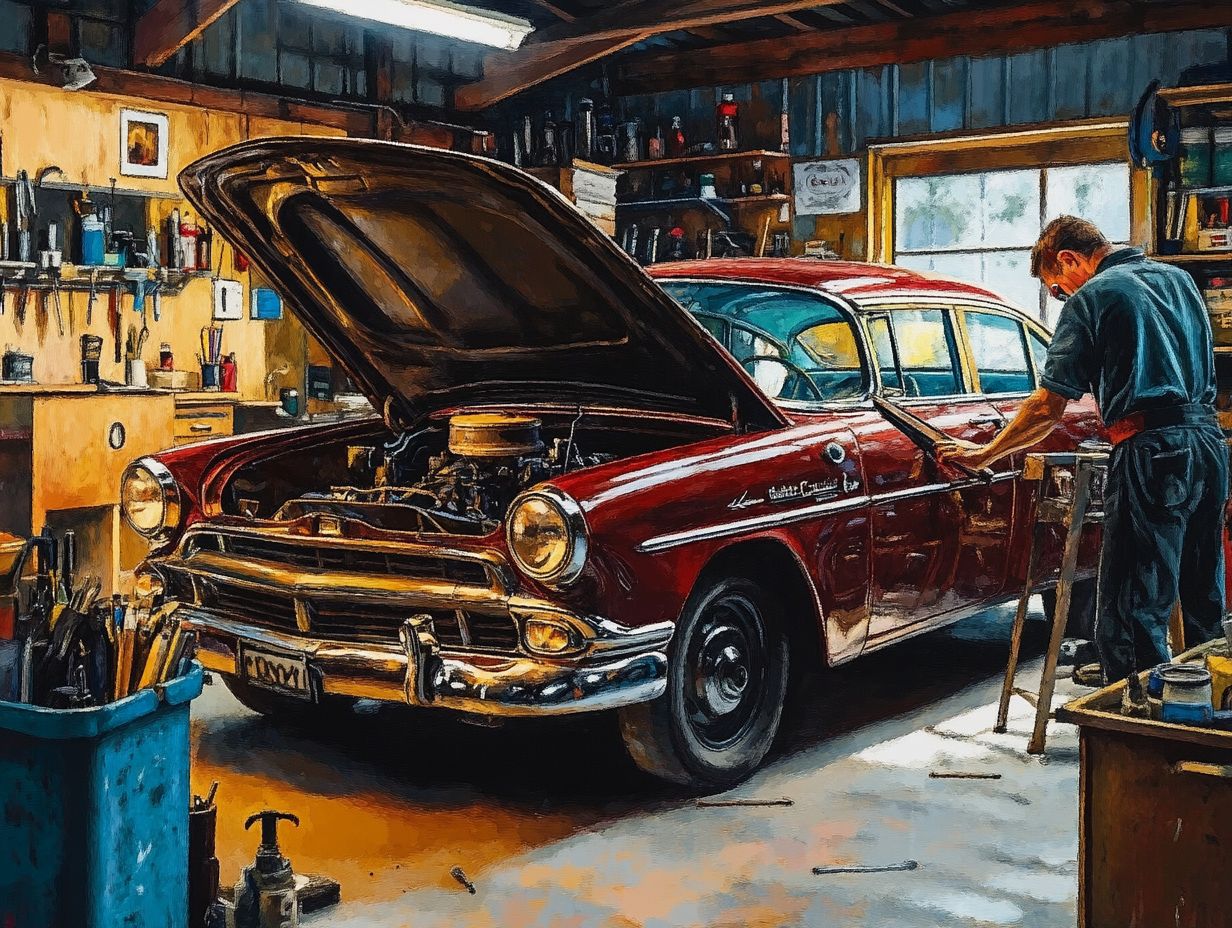
Engine repairs rank among the most vital car repairs that can significantly impact your vehicle’s overall performance. Regular engine tune-ups, such as replacing spark plugs and oxygen sensors, boost efficiency and extend your car’s lifespan. Addressing engine issues promptly prevents costly failures and maintains smooth operation.
Ignoring warning signs like unusual noises, sluggish acceleration, or that dreaded illuminated check engine light can lead to more serious damage over time. Symptoms such as rough idling or decreased fuel efficiency signal that it s time to seek professional attention.
Regular maintenance tasks, including oil changes and coolant checks, are crucial for keeping your engine in peak condition. By identifying and resolving issues early, you protect yourself from the risks of more extensive repairs, ensuring your vehicle remains reliable and efficient on the road.
Electrical System Repairs
Electrical system repairs are essential for maintaining the functionality and reliability of your modern vehicle. The electrical system includes various components like the battery, car alarms, and wiring, all of which are vital for ensuring everything operates smoothly. By addressing electrical issues promptly, you can prevent more severe problems from arising and enhance your overall driving safety.
You might notice common symptoms of electrical system failures, such as dimming headlights, frequent blown fuses, or intermittent starting issues. These signs indicate underlying problems that require immediate attention!
Regular checks prolong the lifespan of crucial components and foster a safer driving environment. Ignoring these symptoms can lead to costly repairs later. This underscores the importance of proactive maintenance.
By routinely inspecting your battery, testing the wiring condition, and ensuring all connections are secure, you can significantly reduce the likelihood of unexpected breakdowns and elevate your vehicle’s performance. Schedule your vehicle inspection today!
Tire and Wheel Repairs
Tire and wheel repairs are crucial for maintaining your vehicle’s optimal performance and safety on the road. Regular tire repairs and checks on wheel alignment enhance handling and fuel efficiency. Neglecting these aspects risks uneven wear and a shortened tire lifespan, leading to expensive replacements down the line.
Stay vigilant by checking your tire pressure and tread depth to catch issues before they escalate. This ensures a smoother ride and bolsters your safety. Common problems like punctures, sidewall bulges, and uneven wear patterns are often preventable with proper maintenance strategies.
Establish a regular schedule for inspections and rotations to maximize your vehicle’s performance. Engaging in proactive tire and wheel care significantly reduces the chances of facing unexpected road hazards and costly emergency repairs. Don’t wait until it’s too late!
Transmission Repairs
Transmission repairs are essential for ensuring your vehicle operates smoothly. They directly influence your ability to change gears effectively. By committing to regular maintenance, including checking transmission fluid levels the fluid that helps your vehicle shift gears smoothly and identifying potential issues early on, you can stave off costly repairs in the future.
Remain vigilant for common signs of transmission issues, such as slipping gears, delayed shifts, or strange noises while driving. These symptoms often signal underlying problems that, if ignored, could escalate into major repairs or even necessitate a complete replacement.
To mitigate such risks, incorporate preventive maintenance steps to significantly extend your vehicle’s lifespan. Regular inspections, along with fluid changes as recommended, are vital components of responsible vehicle care. Timely repairs boost your vehicle s performance and enhance safety on the road. Address transmission issues immediately!
Signs That Your Car Needs Repairs
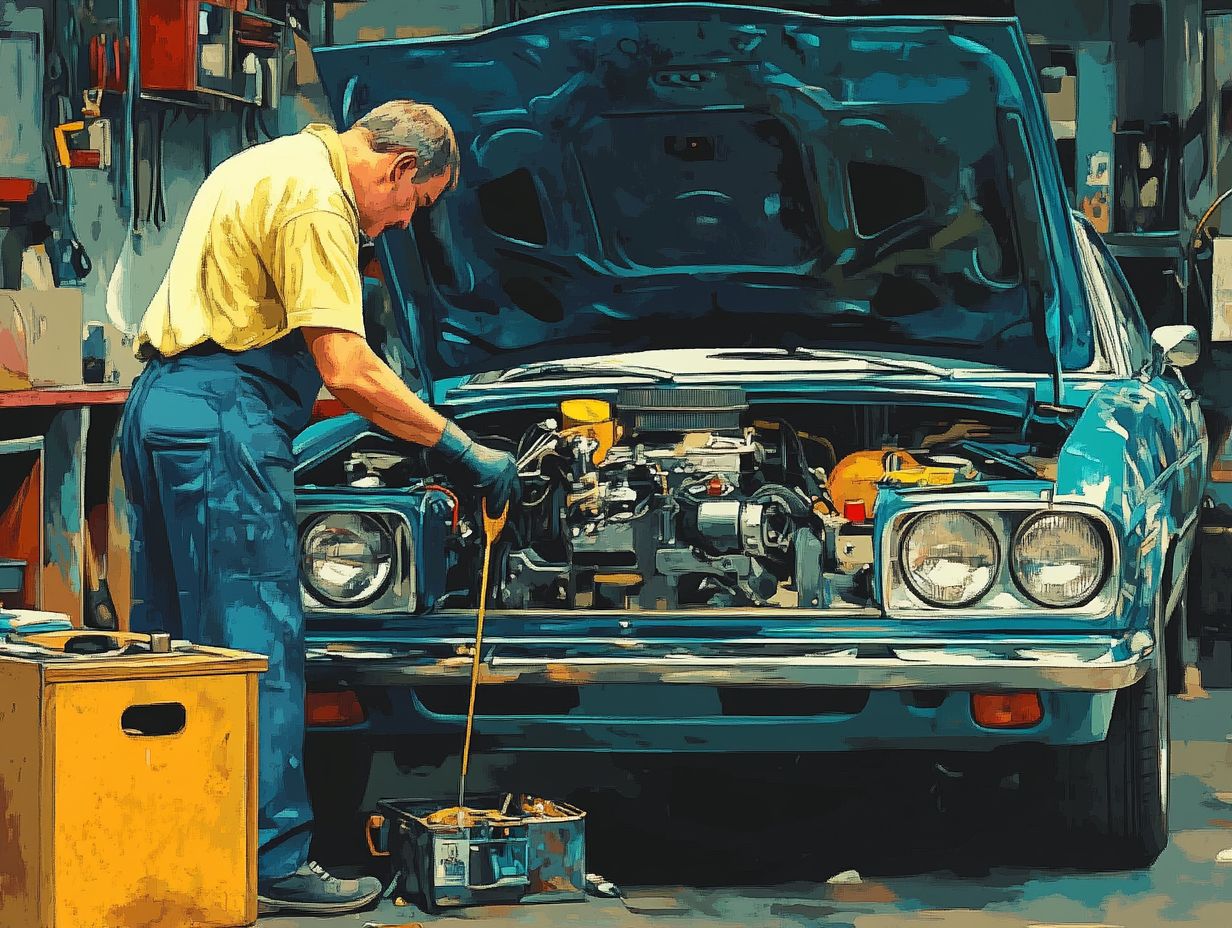
Recognizing the signs that your car needs repairs is essential for ensuring both safety and optimal performance. Pay attention to various warning signals unusual noises, dashboard warning lights, and a noticeable drop in performance. All of these can indicate underlying issues that demand your immediate attention!
Ignoring these cues may escalate repair costs and pose significant safety risks while you’re on the road. Stay proactive and keep your vehicle in top shape!
Identifying and Addressing Warning Signs
Identifying and addressing warning signs is essential for you as a vehicle owner committed to regular car check-ups.
Recognizing these signs is vital. For instance, if you hear unusual noises when turning the steering wheel or if the brakes feel spongy, these could indicate underlying issues. Dashboard warning lights, like the check engine light, should never be brushed aside. Regular visual inspections of fluids, belts, and hoses can reveal early signs of wear and tear that you wouldn t want to overlook.
By promptly addressing these indicators, you can steer clear of costly repairs later on, ensuring your car operates efficiently and safely. Regular car check-ups not only enhance your vehicle’s longevity but also provide you with peace of mind, ultimately creating a safer driving experience.
How to Choose a Reliable Car Repair Shop
Selecting a dependable car repair shop is vital for ensuring quality and transparency in your vehicle maintenance. Consider factors such as customer reviews, certifications, and the shop s experience. These elements can significantly impact the reliability of the services you receive and ultimately influence your repair bills and overall costs.
Engage in thorough car research to make an informed decision, ensuring your vehicle receives the exceptional care it deserves.
Factors to Consider When Selecting a Repair Shop
When selecting a repair shop, consider these factors to ensure you receive reliable and high-quality service. Key elements to think about include customer reviews, certifications, service offerings, and the shop’s overall reputation within the community.
Make sure to check the mechanics’ qualifications. Skilled professionals are more likely to do a great job! Additionally, the availability of a detailed estimate before the service can indicate transparency in pricing, allowing you to compare rates and avoid any unexpected expenses.
Check for warranty offerings on repairs. This can give you peace of mind regarding the longevity and dependability of the service. Ultimately, understanding these factors gives you the power to make informed decisions, ensuring your car receives the best possible care while effectively managing costs.
Frequently Asked Questions
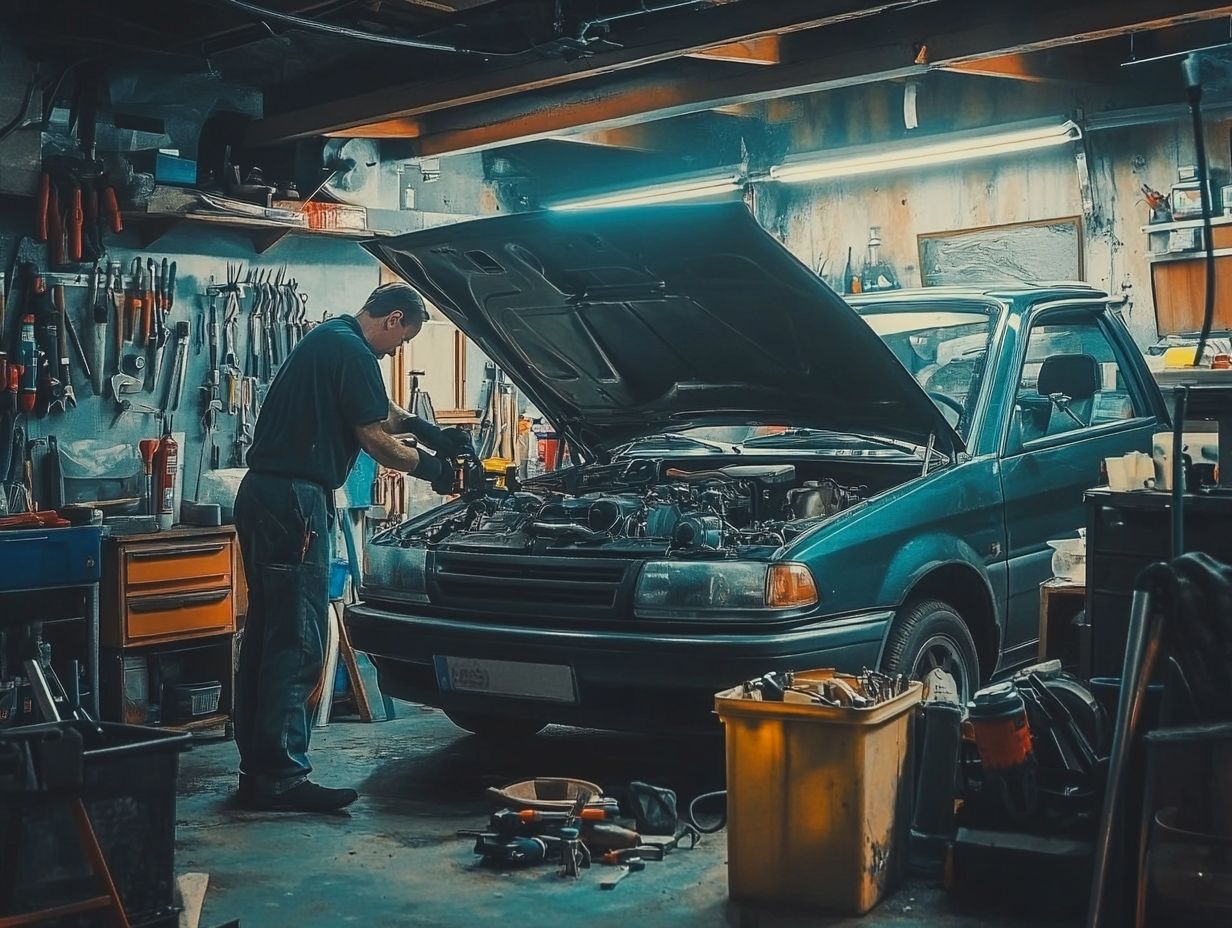
What Are the Most Common Car Repairs?
The most common car repairs include oil changes, tire replacements, brake repairs, battery replacements, and air filter replacements.
What is the average cost of the most common car repairs?
The average cost of the most common car repairs can vary depending on the make and model of the car but typically ranges from $50 to $200.
Why are oil changes considered one of the most common car repairs?
Oil changes are essential for maintaining the health and longevity of a car’s engine. Over time, oil can become dirty and lose its lubricating abilities, causing damage to the engine if not changed regularly.
Do I really need to replace my tires every few years?
It is recommended to replace tires every 3-4 years, as they can become worn and unsafe over time. This is especially important for maintaining good traction and handling on the road.
What should I do if my brakes start making a squealing noise?
If your brakes are making a squealing noise, it is likely time for a brake repair. Ignoring this issue can lead to further damage to the braking system and put you at risk for accidents.
How often should I have my car’s battery checked?
It is recommended to have your car’s battery checked at least once a year, as extreme temperatures and age can affect its performance. Regular maintenance can help prevent unexpected battery failure.
Stay proactive about your car’s health and schedule a check-up today!


